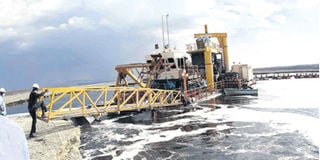200 workers to lose jobs at soda ash firm

A dredging machine harvests soda ash at Tata Chemicals Magadi in Kajiado County.
What you need to know:
- Electricity bills go up to Sh70 million per month, yet that is only 23 per cent of the energy costs. The plant to be closed accounts for 70 per cent of the company’s energy consumption.
- In 2005, it was acquired by Tata Chemicals as part of an international expansion plan. Mr Mbui took over as managing director at the beginning of 2013, from Mr Michael Odera who had worked at the company for over two decades.
Tata Chemicals Magadi is to scale down operation by closing down its main factory, leaving more than 200 permanent workers jobless.
The soda ash manufacturer owned by one of India’s largest companies blames high energy costs for the closure.
The number of affected employees could be higher as the fate of some contract staff is unclear. The firm, in Kajiado County, employs 500 permanent workers.
Those to go home will have the option of voluntary early retirement before the company begins declaring redundancies.
“This facility has been in operation but has become sensitive due to the high energy costs that Tata Chemicals Magadi incurs in maintenance.
“The company intends to stabilise the loss making that it has encountered,” its managing director, Mr Jack Muchira Mbui, yesterday told a news conference.
The firm spends about Sh300 million per month on energy costs, the bulk of which is incurred on heavy fuels needed to convert trona to soda ash.
Electricity bills go up to Sh70 million per month, yet that is only 23 per cent of the energy costs. The plant to be closed accounts for 70 per cent of the company’s energy consumption.
Besides the energy burden, the company has been hit by import duties on its products. In the 2012/2013 financial year, India and Pakistan imposed an anti-dumping duty of about $20 (Sh1,720) per tonne on all soda ash from Kenya.
Customer orders will keep the factory in operation for the next one month, with the expected closure date being mid-July.
Although Tata Chemicals will close the factory, it intends to maintain all equipment in working condition, a process known as mothballing.
The company said it would seek a more “viable energy source” before restarting the plant. In its 2012/2013 annual report, Tata Chemicals Magadi said it would explore “coal gasification in lieu of heavy fuel oil”.
Magadi Town has a population of 5,000 who rely on the company for their economic security.
However, Mr Mbui said the retrenchment would be felt the most by workers at the company’s transport system and at its shipping facility in Mombasa.
In a message sent to the Saturday Nation, Kajiado Governor David Nkedianye said the planned scaling down of the plant was “very bad news”.
He said the county government was in discussions with Tata Chemicals on possible mitigation measures.
At least one per cent of the soda ash used by manufacturers around the world is sourced from the Magadi plant and Mr Mbui estimates that Kenya will, in the short term, lose about Sh4.4 billion ($50 million) in foreign exchange per year after the closure.
The MD said the issue highlighted a dire need for affordable and reliable power in Kenya for the survival of the heavy industry sector.
That is a concern that has often been voiced by other manufacturers. For some firms, frequent power outages, and not the cost of electricity, is the main problem.
“In our plant in Kaloleni, the main power problem we have is the inconsistency. It affects the cost of operations and everything else,” said Athi River Mining managing director Pradeep Paunrana, who is the incoming chairman of the Kenya Association of Manufacturers.
“We need to isolate the issues affecting the cost of doing business in the entire value chain and make improvements.”
Tata Chemicals Magadi (formerly Magadi Soda) has operated in Kenya for more than 100 years having been established in 1911 by the British.
In 2005, it was acquired by Tata Chemicals as part of an international expansion plan. Mr Mbui took over as managing director at the beginning of 2013, from Mr Michael Odera who had worked at the company for over two decades.
Soda ash is used in the manufacture of household detergents and glass. Premium soda ash is used in the manufacture of float glass.
The firm’s main markets lie in the Middle East and South East Asia.
The company says that it will now focus its efforts on standard ash as well as salt production.
Tata Chemicals Magadi (formerly known as the Magadi Soda Company) is closing down its premium ash plant which was commissioned in 2006 at a cost of Sh9 billion but has since failed to be profitable.
The loss-making factory has cost the company Sh16.4 billion ($187 million) over the last eight years.





